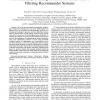Free Online Productivity Tools
i2Speak
i2Symbol
i2OCR
iTex2Img
iWeb2Print
iWeb2Shot
i2Type
iPdf2Split
iPdf2Merge
i2Bopomofo
i2Arabic
i2Style
i2Image
i2PDF
iLatex2Rtf
Sci2ools
AINA
2015
IEEE
2015
IEEE
Item Similarity Learning Methods for Collaborative Filtering Recommender Systems
Abstract—As one of the most popular recommender technologies, Collaborative Filtering (CF) has been widely deployed in industry due to its simplicity and interpretability. However, it is facing great challenge to generate accurate similarities between users or items because of data sparsity. This will cause secondorder error in the process of using weighted sum as prediction. To alleviate this problem, we propose several methods to learn more accurate item similarities by minimizing the squared prediction error. This optimization problem is solved using Stochastic Gradient Descent. A comprehensive set of experiments on two real-world datasets at error and classification metrics indicate that the proposed methods can achieve comparable or even better performance than other state-of-the-art recommendation methods of Matrix Factorization, and greatly outperform traditional item based CF method. Besides, the proposed methods inherit the interpretability of item based CF, which makes the...
Related Content
| Added | 15 Apr 2016 |
| Updated | 15 Apr 2016 |
| Type | Journal |
| Year | 2015 |
| Where | AINA |
| Authors | Feng Xie, Zhen Chen, Jiaxing Shang, Wen-Liang Huang, Jun Li |
Comments (0)

